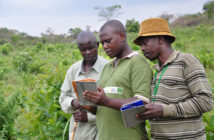Worldwide, tourism accounts for over 9.8% of the global GDP. One in 11 people are employed within the tourism sector. Clearly it plays a crucial part in many local and international economies. Even though tourism is a major part of the economy and allows people to experience different cultures and places, it can often be seen as detrimental to both the local environment and culture.
In the eyes of many environmental conservationists, tourism is thought of as negative in regard to the environment. According to the United Nations Environment Programme, tourists on cruises in the Caribbean can often produce up to four times more trash than locals on shore. With issues like pollution, resource depletion, and land degradation, it can be difficult to see how tourism could ever be sustainable.
You have probably heard of the term sustainable tourism. Many tourist attractions are labeled as sustainable or “eco-friendly;” however, it is difficult to define in reality. Sustainable tourism does not harm the environment, nor does it displace local culture. It’s much easier to measure the amount of trash produced by tourists versus locals than to determine the cultural impact of an expanding tourism industry.
For tourism to truly be sustainable, you have to take into account social and cultural factors along with the environmental factors. Often times, commercial resorts are built on picturesque natural landscapes, often in poor countries. Besides the benefit of employment opportunities, there may not be many more benefits for locals. One example of this is on the island of Mauritius. This case study explains that on Mauritius, domestic tourism hardly exists. This means that many leisure activities and attractions are geared primarily towards foreigners. Resort and hotel services are often too expensive for locals, and beach access is even limited to hotel-goers. Fortunately after pressure from locals, efforts to expand domestic tourism succeeded in bringing events to local Mauritians. On the other hand, tourism sometimes has the ability to strengthen a local culture. Historical landmarks are often preserved and local traditions emphasized for the purpose of entertaining tourists. Although the original purpose of this was primarily for tourism, in some cases it does have the power to strengthen traditional cultures.
In addition to different cultures, these picturesque locations are also often home to biologically diverse natural habitats, which are often disregarded by tourists who, sometimes, are just seeking a relaxing and fun getaway. Not to say that these types of vacations are bad. However, it is still important to be aware of the culture and environment of the place you are visiting.
3 Ways You Can Become a Better Tourist:
- Educate yourself about the location you are visiting. Learning about the culture of the place you are going doesn’t just allow you to be more respectful of the locals, but you may also gain a deeper sense of appreciation for the overall culture, history, and lifestyle.
- Try not to opt for convenience. When traveling, a lot of the time it can be easier to leave your water bottle at home and buy disposable plastic bottles. The same goes for plastic bags, utensils, etc. However convenient this may be, it often means paying a price for the environment.
- What you can do instead:
- Bring a reusable water bottle.
- If you are traveling to a country where it is unsafe to drink the local tap water, seek out the large, plastic water containers that you can use to refill your bottle, so you don’t have to go through heaps of plastic bottles each day. When you finish each container, try to find somewhere to recycle it.
- When shopping, bring your own bag, so you don’t have to use a new plastic bag each time you buy something.
- What you can do instead:
- Think of the place you are visiting as your own home. Wherever you go, it’s bound to be the home of other people or animals. Keep this in your mind as you go about your travels so you remember to take care of the place as you would your own home. Just because you are enjoying some relaxing time in a new place doesn’t mean you should take a break from being aware of how you are impacting the environment!
The world is becoming more connected than ever, and, because of that, tourism is an ever-growing industry. With the growing population, it is only going to expand further. Like the vast majority of global issues, there isn’t one answer that will solve all of the problems that come with tourism. In fact, many people argue that it is not possible for tourism to ever be sustainable; however, tourism isn’t going anywhere, so we need to work to bring a greater awareness of how to travel in a way that not only doesn’t harm, but can even benefit people, animals, and the environment.






